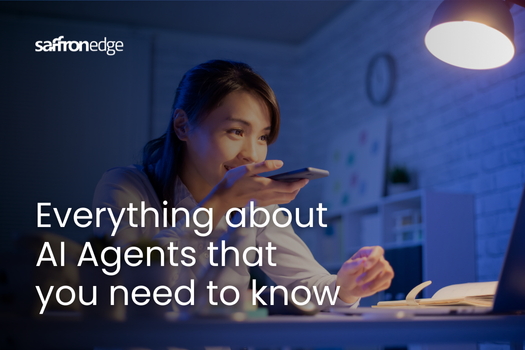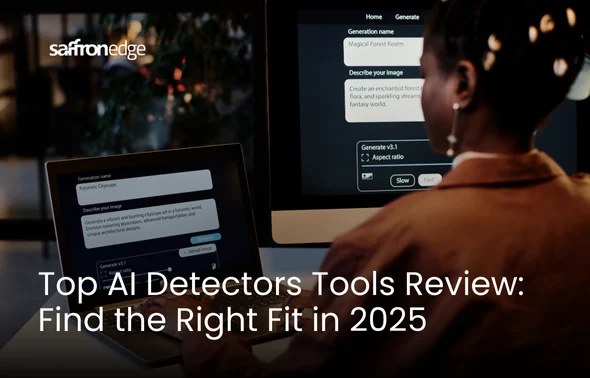Contents
Artificial intelligence has changed how businesses operate, largely due to AI agents. But what exactly are they, and how can they add value to your company?
An AI agent is an autonomous program interacting with its environment to achieve specific goals. These agents make decisions, learn from past experiences, and improve their performance over time.
Understanding AI agents, their components, types, and benefits is crucial for businesses leveraging AI for better results. This guide will explain how AI agents work and the value they bring to business operations.
What is an AI agent?
An AI agent is an autonomous or semi-autonomous system designed to interact with its environment and perform tasks to achieve specific goals. In simple terms, what is AI agent?
It’s a computer program that perceives its surroundings, makes decisions based on that perception, and takes actions to accomplish predefined objectives.
The AI agent can be used in various applications, from virtual assistants like Siri and Alexa to autonomous vehicles that navigate and make decisions based on real-time data.
It can function with minimal human intervention, using machine learning and algorithms to improve its performance over time.
Key Components of AI Agents
AI agents rely on three fundamental components:
-
Perception
-
Reasoning
-
Action modules
These components work together to process information, make decisions, and take action. Understanding these key elements is essential to grasping how AI agents operate efficiently.
1. Perception Module
The perception module acts as an AI agent's sensory system. It gathers information from various sources, such as physical sensors or digital inputs.
-
Physical Perception: In real-world AI applications, this could include cameras, microphones, motion detectors, or temperature sensors, allowing the agent in AI to interpret the physical environment.
-
Digital Perception: In software-based AI agents, perception may come from text inputs (e.g., user prompts), web APIs, browsing histories, system logs, or databases.
2. Reasoning Module
Once the AI agent has gathered information, the reasoning module processes and analyzes the data. This is essentially the agent in artificial intelligence's "brain," where computational models, algorithms, and machine learning techniques come into play.
-
It stores past interactions, frequently asked questions, or learned rules, allowing the AI to make more informed decisions.
-
The module recognizes patterns and applies logical frameworks to evaluate options before selecting the best action.
For example, an AI-powered customer support bot can remember a user’s past queries and provide responses based on previous interactions, making the conversation more personalized and efficient.
3. Action Module
The action module is the final step in an AI agent’s workflow. It executes decisions based on the processed data and allows the agent to interact with users, systems, or the physical world through various output formats.
-
Physical Output: In robotics or smart devices, this might involve mechanical movement, like a robotic arm assembling parts in a factory.
-
Digital Output: This could include generating a text response, updating a database, triggering a notification, or displaying information on a screen for software-based AI agents.
Different Types of AI Agents
AI agents can be categorized into various types based on their level of intelligence, adaptability, and how they interact with their environment. Here are the key types:
1. Simple Reflex Agents
These AI agents operate on predefined rules and respond directly to environmental conditions. They work best for tasks requiring real-time responses, such as spam filters or automated stock trading bots. However, they lack memory and learning capabilities.
2. Learning Agents
Learning agents improve their performance by analyzing past experiences and adapting their behavior. They are widely used in AI-powered chatbots automation and recommendation engines that refine their responses based on user interactions.
3. Model-Based Reflex Agents
Model-based reflex agents have an internal representation of the world, allowing them to make better decisions. They are commonly used in self-driving cars and robotics, where understanding the environment is crucial.
4. Goal-Based Agents
These agents evaluate potential outcomes and select the best action to achieve a specific goal. AI-powered virtual assistants like Siri or Google Assistant fall into this category, as they analyze user queries and provide relevant responses.
5. Utility-Based Agents
Utility-based agents go beyond goal achievement by considering different possible actions and choosing the one that maximizes a utility function. They are commonly used in healthcare and financial applications where risk assessment and optimization are key.
6. Hierarchical Agents
These agents break down tasks into sub-tasks and manage them at different levels of abstraction. They are useful in complex environments like supply chain management and enterprise resource planning (ERP) systems.
7. Multi-Agent Systems
Multi-agent systems involve multiple AI agents working collaboratively or competitively to achieve complex objectives. These are commonly used in traffic control systems, gaming AI, and fraud detection applications.
The Benefits of AI Agents
From marketing and customer support to sales and operations, AI agents streamline workflows, reduce costs, and drive data-driven decision-making.
One of the biggest advantages of AI agents is 24/7 availability. Unlike human employees, AI agents can work around the clock, ensuring seamless customer support and task execution.
-
Increased Efficiency: AI agents manage multiple customer interactions simultaneously, reducing response times and improving service efficiency. This allows businesses to handle higher inquiry volumes without compromising quality.
-
Cost Savings: AI agents can significantly reduce operational costs by automating tasks that would otherwise require large customer service teams. Instead of hiring additional employees, businesses can leverage AI-powered automation to increase productivity at a lower cost.
-
24/7 Availability: AI agents operate 24/7, addressing customer inquiries promptly, regardless of business hours or time zones. This consistent availability improves customer satisfaction and retention.
-
Personalized User Experience: AI agents analyze user behavior, preferences, and past interactions to provide tailored recommendations. Over time, they learn from data to improve the accuracy of suggestions, leading to more relevant and engaging experiences.
AI Agents vs. Traditional Automation
Traditional automation relies on predefined rules and structured workflows to execute tasks. These systems work efficiently for repetitive, rule-based processes such as data entry, invoice processing, or customer service responses.
However, they lack adaptability and require manual updates when business needs change. In contrast, AI agents use machine learning, natural language processing (NLP), and deep learning algorithms to make real-time intelligent decisions.
Unlike traditional automation, AI agents can process large volumes of unstructured data, recognize patterns, and continuously improve their performance through learning. This makes them highly valuable in dynamic business environments where adaptability and data-driven decision-making are essential.
For example, a rule-based chatbot in customer service follows a strict decision tree, responding only to specific keywords. The bot may fail if a customer asks a complex question outside its programmed scope.
On the other hand, an AI-powered chatbot, like a virtual assistant, understands intent, context, and previous interactions, providing a more personalized and accurate response.
| Function | Traditional Automation | AI-Driven Agents |
|---|---|---|
| Customer Support | Pre-programmed chatbots with limited responses. | AI chatbots understand context and intent and learn from interactions. |
| Marketing Personalization | LRule-based email sequences. | AI-powered recommendation engines that tailor content dynamically. |
| Fraud Detection | Fixed pattern recognition for fraud detection. | AI models that adapt and recognize new fraudulent behaviors in real time. |
| Sales and Lead | Automated email responses based | AI-driven assistants that analyze |
| Generation | on if-then conditions. | customer behavior and predict conversion likelihood. |
| Supply Chain Management | Predefined logistics and inventory rules. | AI-driven predictive analytics that adjusts supply chain operations dynamically. |
Risks and Limitations of AI Agents
While AI agents offer numerous advantages, they also come with challenges that businesses must navigate carefully.
1. Ethical Concerns and Biases in AI Decision-Making
AI agents rely on data to make decisions, but if the training data contains biases, the AI can reinforce and amplify those biases. This can lead to unintended consequences, such as biased hiring decisions, discriminatory loan approvals, or skewed advertising recommendations.
Ensuring fairness in AI decision-making requires continuous monitoring and diverse datasets.
2. Data Privacy and Security Challenges
AI agents process vast amounts of personal and business data, raising concerns about privacy and security. Unauthorized access, data breaches, or misuse of AI-driven insights can result in serious legal and reputational consequences.
Companies using AI must adhere to regulations like GDPR and CCPA, implement strong encryption, and ensure proper data access restrictions.
3. Dependence on High-Quality Data for Accurate Performance
AI agents require large volumes of high-quality, structured, relevant data for optimal performance. Poor or insufficient data can lead to inaccurate predictions, ineffective decision-making, and flawed outcomes.
Businesses must prioritize data quality management and regularly update AI models with fresh datasets.
4. Balancing AI Automation with Human Oversight
Over-reliance on AI without human oversight can be risky. AI agents are not infallible and may misinterpret data, make incorrect decisions, or fail in complex, high-stakes scenarios.
5 Use Cases of AI Agents in B2B Marketing
A hybrid approach—where AI handles routine tasks while humans provide oversight and intervention when needed—is often the best business strategy. Here are 5 primary use cases:
1. AI-Powered Lead Scoring and Qualification
Traditional lead scoring relies on static rules, such as demographic and behavioral data. AI-driven lead scoring goes further by analyzing vast datasets, identifying patterns, and predicting which leads are most likely to convert.
AI agents evaluate engagement levels, website interactions, and past purchasing behavior, helping sales teams prioritize high-potential prospects.
2. Hyper-Personalized Content and Recommendations
AI agents enhance B2B content marketing by delivering hyper-personalized experiences. Instead of sending generic emails, AI-powered marketing agents analyze user behavior, preferences, and engagement history to recommend tailored content.
Platforms like HubSpot and Salesforce leverage AI to optimize email timing, personalize messaging, and increase engagement rates.
3. Intelligent Chatbots for Customer Support and Sales
AI-powered chatbots go beyond answering FAQs—they assist in lead generation, nurture prospects, and provide 24/7 customer support. For example, an AI chatbot on a SaaS company's website can answer product-related questions, schedule demos, and suggest the right pricing plan based on customer needs, improving conversion rates.
4. Predictive Analytics for Market Trends and Customer Behavior
AI agents help B2B marketers anticipate market trends, customer behavior shifts, and demand fluctuations. Predictive analytics models analyze historical data, social media sentiment, and competitive insights to guide decision-making.
Marketers can use these insights to adjust campaigns, create relevant content, and improve customer targeting.
5. Automated PPC Campaign Optimization
Manually managing pay-per-click (PPC) campaigns can be inefficient and costly. AI-driven agents optimize PPC campaigns by analyzing real-time ad performance, adjusting bids, and allocating budgets for maximum ROI.
AI marketing agents like Google’s Smart Bidding or Facebook’s AI-driven ad targeting help businesses generate better results with minimal human intervention.
8 Tips for Successfully Implementing AI Agents
If you plan to implement AI agents, it is essential to approach the process methodically to maximize their effectiveness. Here are 8 key tips to help guide your deployment:
1. Set Clear, Measurable Objectives
Clearly define what you want to achieve with your AI agents. Whether improving customer satisfaction, reducing response times, or cutting costs, having specific goals will help you stay on track and measure success.
2. Prepare Your Data
AI agents need high-quality data to perform well. Ensure you have clean, well-organized data, including customer interactions and transaction histories. Properly structured data will provide accurate and relevant results for your AI agents.
3. Choose the Right Type of AI Agent
Consider your business needs when choosing an AI agent. A reactive agent may handle simple, repetitive tasks well, while goal-oriented or learning agents are better suited for complex or evolving scenarios.
4. Integrate with Existing Systems
Ensure your AI agents are integrated with existing CRM software or customer service platforms for smooth operation. This integration helps the AI agents access relevant information and perform tasks more efficiently.
5. Focus on User Experience
Make sure your AI agents provide a seamless and user-friendly experience. Test their interactions thoroughly to ensure the responses are accurate, timely, and aligned with customer expectations.
6. Monitor and Optimize Performance
Continuously track your AI agents' performance. Collect user feedback and use it to make adjustments, ensuring that the AI remains effective and capable of adapting to changes in customer behavior.
7. Ensure Human Oversight for Complex Situations
AI agents can handle many tasks, but there will be times when human intervention is necessary. Plan for situations where an AI agent needs to escalate an issue, such as complex or sensitive queries. Set clear guidelines on when and how human agents should get involved to ensure smooth transitions and maintain service quality.
8. Prioritize Data Privacy and Security
Implement strong security measures to protect customer data. Comply with privacy regulations and conduct regular audits to safeguard sensitive information and maintain user trust.
Conclusion
In B2B marketing, AI agents play a crucial role in personalization and lead generation. By analyzing user behavior, they tailor content, recommend products, and automate email campaigns, improving engagement and conversion rates.
Businesses leveraging AI marketing agents experience higher efficiency, better customer targeting, and improved ROI. As AI technology evolves, AI agents will become even more advanced, driving innovation and business growth across industries.
If you want to integrate AI-driven automation into your business, Saffron Edge provides cutting-edge AI solutions that fit your business. Contact us today to see how AI agents can help you streamline operations and drive business success!
Need Custom AI Agent?
Frequently Asked Questions
What is an AI agent?
An AI agent is software that perceives its environment, processes data and takes actions to achieve goals. It uses machine learning, NLP, and automation to assist users and optimize tasks. Examples include chatbots, recommendation engines, and autonomous systems.
How do AI agents learn?
AI agents improve through different learning methods. Supervised learning uses labeled data, while unsupervised learning detects patterns without labels. Reinforcement learning optimizes actions through trial and error, and knowledge-based learning follows predefined rules for decision-making.
Is ChatGPT an AI agent?
Yes, ChatGPT is an AI agent specializing in NLP. It processes text, understands context, and generates human-like responses. However, it is not autonomous and does not take real-world actions.
What is an example of an AI agent application?
AI agents power chatbots in customer service, analyze healthcare medical records, personalize e-commerce recommendations, and detect cyber threats in real-time. They enhance efficiency across various industries.
What are the different types of AI agents?
Simple reflex agents follow predefined rules, while model-based agents use internal models for decisions. Goal-based agents choose actions based on objectives, utility-based agents optimize outcomes, and learning agents continuously improve through experience.
How do AI agents contribute to business automation?
AI agents automate repetitive tasks like customer support and data entry, reducing costs and increasing efficiency. They also provide data-driven insights, personalize customer experiences, and streamline workflows.
How are AI agents different from traditional software?
Traditional software follows fixed rules, while AI agents learn, adapt, and make autonomous decisions. This flexibility allows AI to handle complex tasks like cybersecurity, predictive analytics, and intelligent customer interactions.
How secure are AI agents in handling sensitive data?
AI agents protect data using encryption, strict access controls, and compliance with GDPR and CCPA. Regular security updates and audits help prevent vulnerabilities and ensure safe operation.
Related Blogs
We explore and publish the latest & most underrated content before it becomes a trend.

Subscribe to Saffron Edge Newsletter!

Need Custom AI Agent?






![AI SEO[1]](https://dsi59nxdlf71n.cloudfront.net/media/4imjghvk/ai_seo-1.png?v=1dc23e388cfa450)

